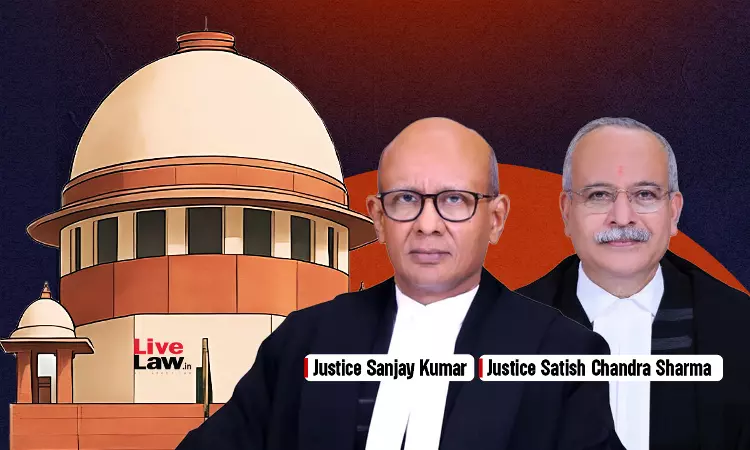- Home
- /
- Supreme court
- /
- 'Every Acquittal Of Actual Culprit...
'Every Acquittal Of Actual Culprit A Blot On System' : Supreme Court Warns Against Misapplying 'Proof Beyond Reasonable Doubt'
Yash Mittal
2 Sept 2025 11:26 AM IST
Minor contradictions or trivial inconsistencies should not be elevated as 'reasonable doubt' to acquit the culprit, the Court cautioned.
The Supreme Court on Monday (Sep. 1) cautioned against granting acquittals by loosely invoking the principle of 'beyond a reasonable doubt', emphasizing that minor contradictions in evidence cannot be elevated to the level of reasonable doubt to justify an acquittal. The Court emphasized that the application of the principle of 'proof beyond reasonable doubt' to acquit the accused should not...
The Supreme Court on Monday (Sep. 1) cautioned against granting acquittals by loosely invoking the principle of 'beyond a reasonable doubt', emphasizing that minor contradictions in evidence cannot be elevated to the level of reasonable doubt to justify an acquittal.
The Court emphasized that the application of the principle of 'proof beyond reasonable doubt' to acquit the accused should not be used in every case where there were minor inconsistencies, contradictions and deficiencies in the prosecution's case; otherwise the misapplication of this principle results into culprits walking free by taking benefit of doubt.
The bench comprising Justices Sanjay Kumar and Satish Chandra Sharma set aside the Patna High Court's decision, which had acquitted the Respondents who were convicted for the rape of a minor under the POCSO Act, based on the minor contradictions and inconsistencies in the prosecution's case, which had not made the prosecution's case highly improbable.
“It is always a matter of utter failure for the system as a whole when a culprit, that too of a heinous sexual offence, manages to walk free by entangling the victim in misapplication of procedural rules, without the knowledge of the victim and without any control of the victim,” the Bench said.
The High Court had acquitted the accused, citing discrepancies about the victim's age, the incident's timing, proof of pregnancy and abortion, defects in framing of charges, and the legality of a joint trial. The Supreme Court, however, found each of these grounds unsustainable.
It held that variations placing the victim between 12 and 15 years did not matter under POCSO, which only requires proof she was below 18. Minor lapses in recalling date and time could not discredit consistent testimony supported by medical evidence. The Court called the High Court's rejection of pregnancy and abortion records 'preposterous,' noting multiple medical and legal documents proved both.
Regarding the defective charge, the Court ruled under Sections 464 and 215 of the CrPC that no prejudice was caused. As for the joint trial under Section 223 CrPC, the Court clarified that mere irregularity is not enough for acquittal without proof of prejudice or miscarriage of justice
The judgment authored by Justice Sharma reaffirmed the principle that reasonable doubt must be serious, rational, and rooted in evidence, not based on trivial contradictions. The judgment underscored that misuse of the standard may allow guilty persons to escape accountability, which undermines societal confidence in justice.
“the principle of beyond reasonable doubt has been misunderstood to mean any and every doubt in the case of the prosecution. Often, we come across cases wherein loose acquittals are recorded on the basis of minor inconsistencies, contradictions and deficiencies, by elevating them to the standard of reasonable doubts. A reasonable doubt is one that renders the version of the prosecution as improbable, and leads the Court to believe in the existence and probability of an alternate version of the facts. It is a serious doubt which must be backed by reason. The underlying foundation of the principle of beyond reasonable doubt is that no innocent should face punishment for a crime that he has not done. But a flipside of the same, of which we are conscious, is that at times, owing to a mis-application of this principle, actual culprits manage to find their way out of the clutches of law. Such misapplication of this principle, resulting into culprits walking free by taking benefit of doubt, is equally dangerous for the society. Every instance of acquittal of an actual culprit revolt against the sense of security of the society and acts as a blot on the criminal justice system. Therefore, not only should no innocent face punishment for something that he has not done, but equally, no culprit should manage an acquittal on the basis of unreasonable doubts and misapplication of procedure.”, the court observed.
Resultantly, the Court allowed the appeal, and directed Respondent Nos. 1 and 2 to surrender before the trial court within a period of two weeks from today to suffer the remaining sentence.
Cause Title: SUSHIL KUMAR TIWARI VERSUS HARE RAM SAH & ORS.
Citation : 2025 LiveLaw (SC) 864
Click here to read/download the judgment
Appearance:
For Petitioner(s) Mr. Daksha Kumar, Adv. Ms. Tanishq Mehta, Adv. Mr. Aftab Ali Khan, AOR Ms. Ankita Baluni, Adv. Mr. Deepak Kumar, Adv. Ms. Sonakshi Monga, Adv.
For Respondent(s) Mr. Talib Mustafa, Adv. Ms. Raksha Agrawal, Adv. Mr. Lzafeer Ahmad B. F., AOR Mr. Manish Kumar, AOR Mr. Shashwat Pratyush, Adv.



